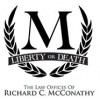
When the government brings a criminal charge, the prosecutor has tremendous training and resources that can be used to prosecute the case. To fight the case, you need an experienced criminal defense attorney devoted to protecting your rights and mounting an aggressive defense. After a criminal accusation, it is important to hire an attorney as soon as possible so that all options for fighting the charges are still available.
The attorneys at Law Offices of Richard C. McConathy represent clients at all stages of the case including the initial investigation before an arrest is made, the first appearance in court after the arrest, during pre-trial status conferences, during evidentiary motion hearings, and at trial. The best result is getting the criminal charges dropped by the prosecutor or dismissed by the trial judge.
Our attorneys understand the importance of filing pre-trial motions to exclude prejudicial evidence, suppress items illegally seized, or dismiss charges not supported by sufficient evidence.
The attorneys at Law Offices of Richard C. McConathy represent clients at all stages of the case including the initial investigation before an arrest is made, the first appearance in court after the arrest, during pre-trial status conferences, during evidentiary motion hearings, and at trial. The best result is getting the criminal charges dropped by the prosecutor or dismissed by the trial judge.
Our attorneys understand the importance of filing pre-trial motions to exclude prejudicial evidence, suppress items illegally seized, or dismiss charges not supported by sufficient evidence.
Services
Richard C. McConathy received his Bachelor of Science in Criminal Justice from the University of North Texas in Denton before earning his Juris Doctor at the Texas Wesleyan University School of Law.
Throughout his legal career, Richard has handled thousands of first, second, and third DWI cases as well as other felony offenses.
Since founding Law Offices of Richard C. McConathy, Richard has aggressively defended the rights of clients accused of DWI in Denton County.
He is licensed to practice in state courts throughout Texas and also handles state appeals.
Throughout his legal career, Richard has handled thousands of first, second, and third DWI cases as well as other felony offenses.
Since founding Law Offices of Richard C. McConathy, Richard has aggressively defended the rights of clients accused of DWI in Denton County.
He is licensed to practice in state courts throughout Texas and also handles state appeals.
Under Texas Penal Code Section 49.04(a), a person commits an offense if the person is intoxicated while operating a motor vehicle in a public place.
In most cases, DWI is punishable as a Class B misdemeanor, with a minimum term of confinement of 72 hours.
The information provided on this site is for general information purposes only.
The information you obtain at this website is not, nor is it intended to be, legal advice.
You should consult an attorney for advice regarding your own individual situation.
In most cases, DWI is punishable as a Class B misdemeanor, with a minimum term of confinement of 72 hours.
The information provided on this site is for general information purposes only.
The information you obtain at this website is not, nor is it intended to be, legal advice.
You should consult an attorney for advice regarding your own individual situation.
In a blood test case, the prosecutor will often present testimony of the senior toxicology analyst at the medical examiner's office and the lab manager in that same office, who performed the laboratory tests on the blood specimen and determined the presence of drugs, a blood THC level, or a blood alcohol concentration (BAC) level.
The toxicology analyst will often testify about their qualifications to conduct the tests and provide testimony about familiar with the protocols involved in administering the tests.
The toxicology analyst will often testify about their qualifications to conduct the tests and provide testimony about familiar with the protocols involved in administering the tests.
Texas under Texas Penal Code § 49.01(2) defines intoxicated as "not having the normal use of mental or physical faculties by reason of the introduction of alcohol" into the body.
The definition also includes intoxication by reason of the introduction of "a controlled substance, a drug, a dangerous drug, a combination of two or more of those substances, or any other substance into the body."
While driving while intoxicated (DWI) is a crime commonly associated with drunk driving and people being under the influence of alcohol, it is important to understand that law enforcement in Texas can arrest a person when they believe an alleged offender was operating under the influence of a controlled substance.
The definition also includes intoxication by reason of the introduction of "a controlled substance, a drug, a dangerous drug, a combination of two or more of those substances, or any other substance into the body."
While driving while intoxicated (DWI) is a crime commonly associated with drunk driving and people being under the influence of alcohol, it is important to understand that law enforcement in Texas can arrest a person when they believe an alleged offender was operating under the influence of a controlled substance.
Texas has a zero tolerance policy for drinking and driving offenses committed by a minor child or young person under the age of 21.
For the purposes of this offense, the term "minor" is defined as anyone under the age of 21 years old.
Different procedures are used to prosecute these cases depending on whether the driver is under the age of 17 years old and prosecuted in juvenile court, or whether the young person is over the age of 17 and goes to adult court.
Because a person under 21 years old may not purchase, consume, or possess an alcoholic beverage, any minor driving with ANY detectable amount of alcohol i n their system while operating a motor vehicle on a public street, can be charged with Driving Under the Influence of Alcohol by a Minor (DUIA by a Minor).
For the purposes of this offense, the term "minor" is defined as anyone under the age of 21 years old.
Different procedures are used to prosecute these cases depending on whether the driver is under the age of 17 years old and prosecuted in juvenile court, or whether the young person is over the age of 17 and goes to adult court.
Because a person under 21 years old may not purchase, consume, or possess an alcoholic beverage, any minor driving with ANY detectable amount of alcohol i n their system while operating a motor vehicle on a public street, can be charged with Driving Under the Influence of Alcohol by a Minor (DUIA by a Minor).
Reviews

Be the first to review Law Offices Of Richard C. McConathy.
Write a Review




